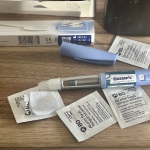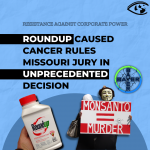WORLD: From Asia to America, How Bausch's Crisis Grew
Early in March, Bausch & Lomb received a troubling phone call from a New Jersey eye doctor. Dr. David S. Chu, a specialist in cornea diseases, alerted the company that three of his recent patients had been afflicted with a microbe that caused a potentially blinding eye infection.
All three, Dr. Chu said, had used Bausch & Lomb's ReNu brand lens cleaners.
For Bausch, Dr. Chu's call on March 3 was the first sign that a puzzling medical mystery that had surfaced in a few Asian markets since the fall might escalate into something worse: a safety problem involving one of its most popular and lucrative products.
The company's steps to that point and in the weeks that followed have come under harsh scrutiny by critics who question whether it reacted fast enough to the first signs of trouble and moved swiftly enough to protect its millions of global customers.
Bausch, for example, quickly confirmed that Dr. Chu's patients had been infected by Fusarium fungi, the same microbes causing a bewildering outbreak of infections among customers in Hong Kong and Singapore. But Dr. Chu, not the company, was the first to report the American cases to federal health authorities.
Moreover, Bausch had agreed to stop selling its ReNu brand cleaner in Hong Kong and Singapore in February, but did not disclose that in the United States. Only on Monday did it decide to withdraw its lead ReNu product, ReNu With MoistureLoc, from all markets around the world.
As of last Friday, the federal Centers for Disease Control and Prevention said it had confirmed 122 cases of the fungal infection, 15 possible ones and 60 still under investigation in 33 states and territories. While a few involve lens cleaners made by other companies, Bausch customers make up the vast majority of those affected.
No official reports exist on the health impact of the outbreak, but a Florida woman has lost an eye and scores of other patients have undergone restorative corneal transplant surgery that has left them with astigmatism and other impairments.
For its part, the company says it moved as rapidly as possible to understand and respond to its product's role in the outbreak. "People get into a C.S.I. mentality where you do a few tests and expect an answer," a spokeswoman, Margaret Graham, said. But Bausch says it took months to figure out that the fungal infections involved a complex interaction of MoistureLoc's ingredients and consumers' own lens-care practices.
Despite the company's reassurances this week that the mystery was solved and that customers could safely switch to an older Bausch & Lomb lens cleaner, doctors and financial analysts are not as certain that the company's Fusarium woes are over.
Bausch's troubles accelerated quickly after Dr. Chu's call, in part because he decided to share his findings with other doctors, and, on March 8, with the Centers for Disease Control. Calls from other doctors quickly followed. On March 22, the F.D.A. began an investigation of the Bausch factory in Greenville, S.C., where lens cleaners involved in the outbreak were made.
Now that Bausch has withdrawn MoistureLoc, a $100-million-a-year product, from global markets, it is stepping up efforts to persuade lens wearers to use an older ReNu version, MultiPlus.
"You can be confident using this proven product," Ronald L. Zarrella, Bausch's chairman and chief executive, has been assuring lens users in a new television advertising campaign for ReNu MultiPlus.
End of MoistureLoc. End of problem?
Not so fast, say eye specialists, financial analysts and plaintiffs' lawyers.
They argue that the company's incremental approach over a period of months to disclosing and dealing with the Fusarium outbreaks leaves too many questions for Bausch to close the books on the matter - especially given that its strategy is to ramp up production of ReNu MultiPlus, which itself has been linked to at least 20 percent of the Fusarium cases reported to the C.D.C.
Dr. John Bullock, a former ophthalmologist who is now an epidemiologist at Wright State University in Dayton, Ohio, and was one of the first to report a possible Fusarium outbreak to federal regulators, said, "I want to see more evidence, but if a patient asked me now whether to use MultiPlus, I'd say throw it away."
Bausch counters that the percentage of Fusarium cases linked to MultiPlus is far less than its 40 percent market share and that the actual number of cases - 19 as of last week - is minute compared with the 30 million lens wearers who have used MultiPlus since it was introduced in 1997.
But financial analysts say that despite annual revenue of about $2.4 billion from a broad optical product line that includes contact lenses and eye surgery devices as well as lens-care solutions, Bausch is under tremendous financial pressure not to find any problems with MultiPlus. The company, based in Rochester, could face a drain on cash if it ends up having to remove MultiPlus from the market, said David Maris of Banc of America Securities.
The MoistureLoc debacle has unfolded while Bausch was already under a financial cloud from an investigation into accounting irregularities in overseas operations. The company has been forced to delay reporting its fourth-quarter 2005 and first-quarter 2006 earnings.
It has said it has more than $550 million in cash, but it has also offered to buy back nearly $544 million in debt and expects to spend up to $70 million on the MoistureLoc recall.
"That doesn't leave a lot of wiggle room for legal liability," Mr. Maris said.
More than a dozen lawsuits have already been filed, and such suits could wind up costing the company $1 billion, Mr. Maris predicted.
Paul J. Pennock, the partner in charge of pharmaceutical and medical-device litigation at Weitz & Luxenberg, a plaintiffs' law firm in New York, predicted that there could end up being 1,500 cases.
Fusarium is common in drains, sinks and many types of plants, especially in tropical climates. Based on Centers for Disease Control estimates, there may be 750 to 1,875 eye infections involving the fungus each year in the United States. Most probably occur when people scratch an eye in a garden or wooded area. But no one knows for sure because doctors rarely report keratitis, as the corneal infection is formally known.
In the current batch of cases, doctors became suspicious after noting how many instances involved patients wearing soft lenses who had no obvious exposure to the fungus. Hong Kong's Health Department put out a public alert about keratitis last August, after four cases were reported there. At that time, no connection was made to MoistureLoc. But Hong Kong officials formally put Bausch on notice of possible links with MoistureLoc on Oct. 20, when it asked the company to investigate the product.
In a little-noticed filing with the F.D.A. in December, Bausch reported 15 cases in Hong Kong among MoistureLoc users but said there were no indications of problems with the product. Indeed, Hong Kong officials found no contamination in four bottles they purchased and tested. They said Bausch wrote them on Feb. 7 that there was no connection to its product and that no remedial steps were necessary.
The first report to strongly associate the problem with MoistureLoc came from Singapore on Feb. 17, after the Singapore National Eye Center noticed a cluster of seven cases the month before. Officials viewed records back to the preceding May and found that the Bausch product had been involved in 18 of 19 cases that were linked to lens use. Bausch quickly agreed to stop selling its soft-lens cleaners in both areas - a move it did not disclose in the United States.
Starting with Dr. Chu's March 3 call to Dr. Levy at Bausch headquarters, though, data about the fungal cases in this country and abroad - eventually including Europe - piled up rapidly. And each new report chipped away at any remaining hopes by Bausch executives that MoistureLoc would be found blameless in the outbreak.
Even so, on March 31, when Bausch issued its first news release in the United States calling attention to the Fusarium outbreak, it said it did not believe that the infections were related to any particular lens-care product.
Bausch also decided not to disclose that nine days earlier, the F.D.A. had begun an unusually intensive investigation of its factory in Greenville, S.C., the major source of ReNu products for the United States and most of Asia. The agency at times had as many as five inspectors searching the plant for clues, instead of the typical field force of one or two in routine inspections.
Bausch itself was already poring over its production and distribution systems in an effort to find the missing links between its products and the infections. That investigation began at the Greenville plant on Feb. 17, the day Singapore reported its MoistureLoc data. One by one, the simple possibilities were ruled out as likely explanations, including direct contamination in the factory or sabotage in the distribution system. And it did not seem to be a matter of customers' having received counterfeit products, which is often a concern in Asia.
Bausch also tested MoistureLoc's ingredients and packaging, both for purity and how they interacted, focusing on 18 variables.
"We have hundreds of people working full time on this," Angela J. Panzarella, vice president for global vision care, said in an interview early this month.
The tension grew as April progressed and the Centers for Disease Control began issuing updates on the outbreak that consistently showed MoistureLoc to be the riskiest lens cleaner by a wide margin.
By the beginning of May, Bausch was confident that the fungi were not being shipped in the product. Genetic analysis of fungi recovered from patients' eyes and their contact lens gear showed that the microbes belonged to several Fusarium strains, which made it unlikely that they came from one factory. Moreover, Bausch found in close to 1,000 tests that samples of MoistureLoc produced at the same time as bottles used by infection patients consistently killed Fusarium.
Such signs pointed toward Fusarium's being picked up where users lived, with consumers' lens-care habits playing at least some role in the infections. In a theory fleshed out through lab tests early this month, Bausch concluded that when the product is improperly used - topping off the solution in the storage case, for example, rather than replacing it - the ingredients in MoistureLoc sometimes combine to form a thin film that shields Fusarium from MoistureLoc's fungus-killing ingredient.
An F.D.A. official, Dr. Daniel Schultz, director of its Center for Devices and Radiological Health, endorsed that theory about MoistureLoc on Monday, along with the company's contention that the evidence to date did not point to safety issues with MultiPlus or other ReNu products. He also praised the company for working with regulators to find the underlying cause of the problem in a "timely and effective way."
But a preliminary report on the Greenville factory that the F.D.A. issued Tuesday criticized Bausch for failing to meet reporting requirements for six keratitis cases it learned of last July. Bausch & Lomb responded yesterday that those cases were not connected to Fusarium infections but rather were general eye inflammations that did not require medical treatment and therefore did not require reporting.
As the crisis unfolded, the company made several crucial decisions whose repercussions may be felt for years. When the Centers for Disease Control released its first data on the United States outbreak on April 10 - Bausch said it was warned only the night before - the results showed that 26 of 28 confirmed cases of Fusarium infections in soft-lens users involved ReNu products, mostly MoistureLoc. Bausch stressed at the time that the health authorities had not concluded the figures were abnormal, but said it was halting shipments of MoistureLoc in the United States as a precaution.
The move, which stopped confusingly short of a recall, reflected Bausch's lingering hopes that more data would chase the cloud over MoistureLoc. The F.D.A. called it "appropriate." But the halt in shipping left retailers with potential liability for continued sales, and many merchants quickly took MoistureLoc - and in a few cases all ReNu products - off their shelves. Belatedly, Bausch realized that it appeared to be more focused on its commercial future than the health risks to customers. Three days later it announced a full United States recall - a precursor to its global withdrawal of the product on Monday.
"I wish we had made the decision the first day not to sell or use it," Ms. Panzarella said.
Another decision that might prove even more fateful was made at the same time as the April 10 suspension of MoistureLoc shipments: to bet heavily on ramping up sales of the older product, MultiPlus.
Dr. Chu, who practices in Newark, is one of many doctors who say they wonder whether MultiPlus is safe. His three original Fusarium patients were one MoistureLoc user, one MultiPlus user and one user of both. Among four newer patients with infections, three used MoistureLoc and one MultiPlus.
"I'm waiting to hear what C.D.C. has to say about it," Dr. Chu said. "C.D.C. has only reviewed a fraction of what is out there."
Andrew Pollack contributed reporting for this article.
- 122 Pharmaceuticals



